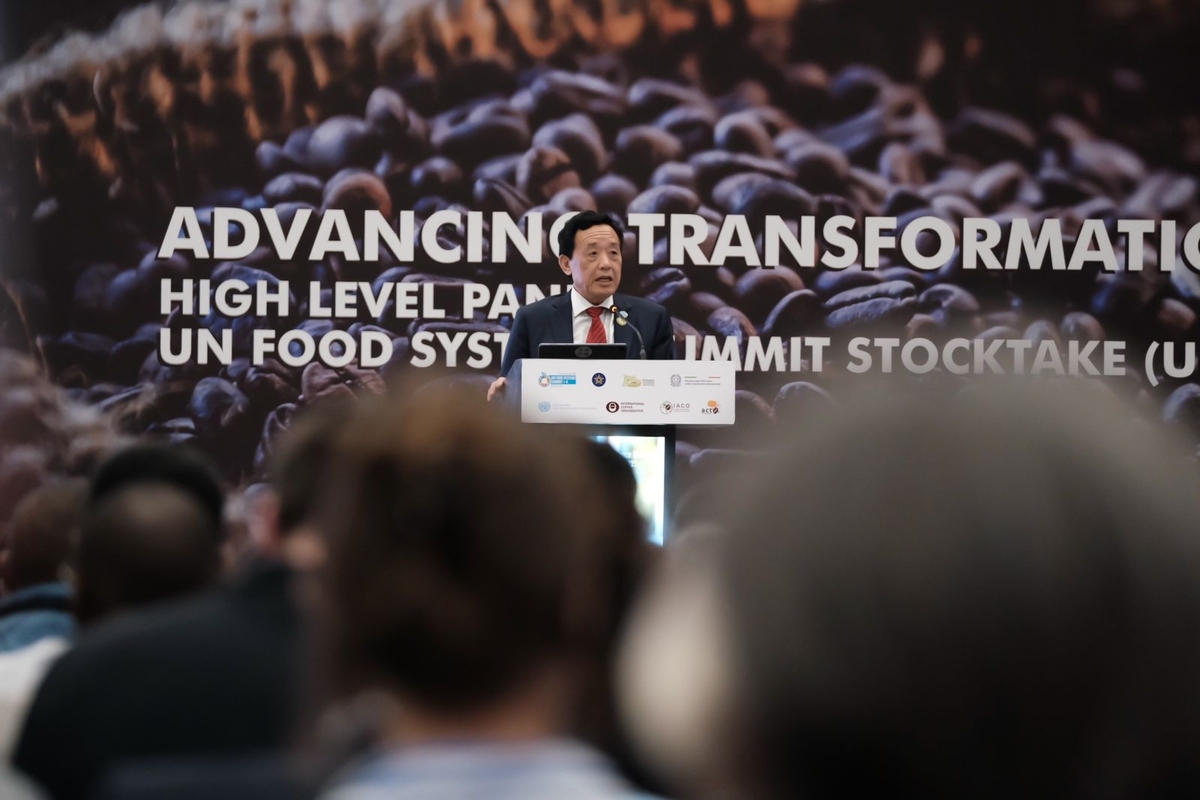November 21, 2025 | 07:10 GMT +7
November 21, 2025 | 07:10 GMT +7
Hotline: 0913.378.918
November 21, 2025 | 07:10 GMT +7
Hotline: 0913.378.918

Over 25 million farmers depend on coffee production worldwide, the majority of them smallholders. Yet, as the FAO Director-General noted, nearly half - some 5.5 million people - live on less than $3.20 a day. Photo: FAO.
Addressing a high-level panel at the UN Food Systems Summit +4 Stocktake (UNFSS+4), the Director-General of the Food and Agriculture Organization of the United Nations (FAO), QU Dongyu, called for urgent and coordinated action to transform the global coffee value chain, highlighting the critical role of smallholder farmers and the pressing need for climate resilience, market readiness, and inclusive investment.
The event, titled “Advancing Transformation of the Coffee Value Chain,” brought together key global actors to chart a sustainable and equitable future for one of the world’s most widely traded commodities. The FAO Director-General, in his opening statement, underscored that " each cup of coffee tells a global story—of culture and trade, but also of livelihoods under pressure and resilience in the face of crisis.”
Over 25 million farmers depend on coffee production worldwide, the majority of them smallholders. Yet, as the FAO Director-General noted, nearly half - some 5.5 million people - live on less than $3.20 a day. “Transforming strategic value chains like coffee is no longer optional,” he emphasized. “It is essential to achieving a more resilient, equitable, and sustainable future.”
Three Pillars of Transformation
The FAO Director-General outlined three critical priorities for transforming the sector:
1. Climate resilience first: The climate crisis is reshaping the global coffee landscape, with projections indicating that up to 50 percent of current coffee-growing areas may become unsuitable by 2050. “The threat is no longer distant - it is happening now,” Qu warned. He highlighted FAO’s work supporting adaptation, from pest management and conserving traditional systems in Panama through FAO’s Farmer Field Schools programme, to agroforestry and climate-resilient coffee variety initiatives in East Africa, and strengthened cooperative models in Cuba.
2. Navigating new market realities: Global trade demands traceability and compliance with evolving sustainability standards. FAO is working closely with producers and governments in countries such as Honduras, Guatemala, and Uganda to design traceability systems, align national policies with international frameworks, and mobilize investment for more than 200,000 smallholders.
3. Investment that matches ambition: Through its Investment Centre and initiatives such as the FAO Hand-in-Hand Initiative, FAO is helping countries unlock and manage financing that benefits farmers and builds long-term value. Projects in Brazil, Costa Rica, and Honduras with partners like the World Bank are improving efficiency and boosting incomes. In El Salvador, FAO supported the development of a comprehensive national coffee plan.
“At FAO our focus is clear: investments must be viable, green, and inclusive,” Qu said. “Coffee must be seen as a driver of agrifood systems transformation as it links climate, trade, biodiversity, and livelihoods.”
A Call to Action
The panel was held under the broader UNFSS+4 framework, a crucial stocktake moment to accelerate progress of country-led agrifood systems transformation. Participants included the Vice President of Uganda, Jessica Alupo, the Minister of Agriculture of Ethiopia, Girma Amante, the Deputy Secretary-General of the United Nations, Amina Mohammed and high-level representatives from the International Coffee Organization (ICO), the World Bank, the Inter-American Development Bank (IDB), and senior officials from Latin America, Africa, and Asia.
The FAO Director-General concluded with a call to collective responsibility and action: “Transforming the coffee value chain is not just an economic necessity - it is a matter of justice, dignity, and the right of every farmer, especially smallholders and rural farmers, to a better future.”
“FAO stands ready — with knowledge, data, tools, and a steadfast commitment to partnerships,” he concluded. “Let us act boldly. Let us invest wisely. And let us put smallholder coffee farmers at the centre of agrifood systems transformation.”
(FAO)

(VAN) Amid vast floodwaters, the spirit of sharing and helping others shown by many people in Gia Lai reached tens of thousands of residents stranded by raging floods.

(VAN) Climate change is set to emerge as a key focus of collaboration within the framework of the Comprehensive Strategic Partnership between Viet Nam and New Zealand.

(VAN) Future veterinarians will be the ones directly deciding how antibiotics are prescribed, administered, guided and managed across thousands of farms nationwide.

(VAN) Argentine Ambassador Marcos Antonio Bednarski says Viet Nam is playing an increasingly influential role in Argentina’s economic and technical engagement in Southeast Asia, as Buenos Aires is seeking long-term partners.

(VAN) Prime Minister requested local authorities to use all available measures to reach residential areas that are deeply flooded, cut off, isolated, or affected by landslides.

(VAN) To confront historic flood surge on Ba and Kon rivers, the Prime Minister requested local authorities to mobilize all available forces, evacuate residents, and ensure reservoirs and dams safety.

(VAN) The United Kingdom (UK) has offered to assist Vietnam in accessing significant financial resources to drive agricultural innovation while simultaneously expanding the market for forest-based carbon credits.